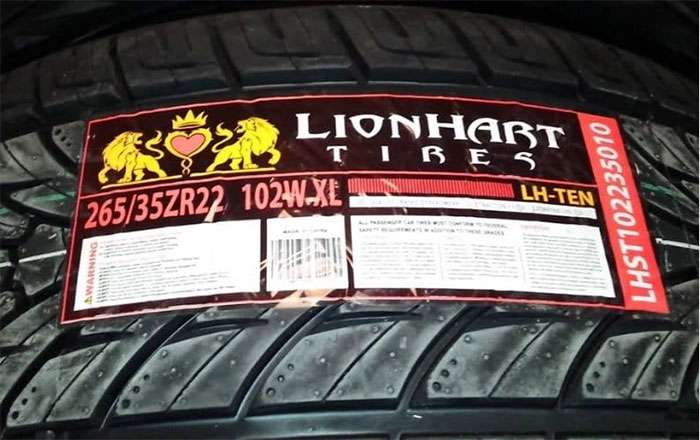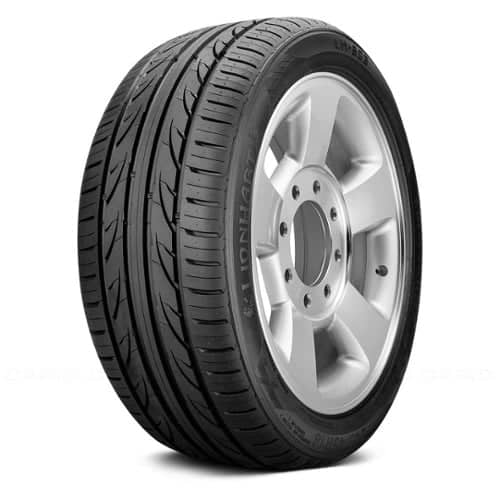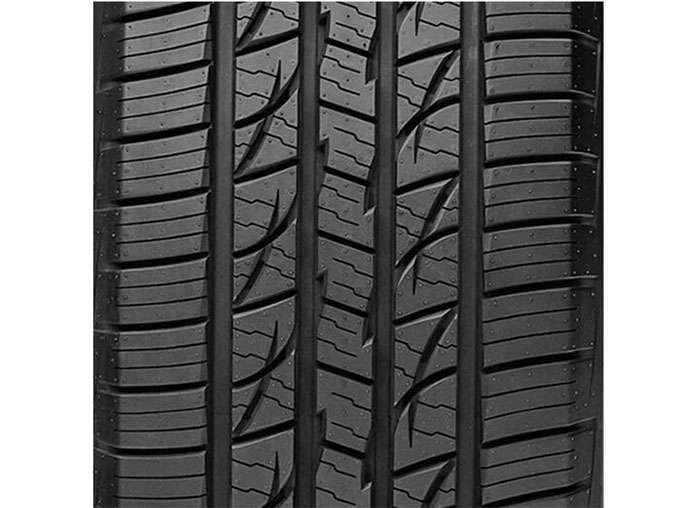
Are Lionhart tires good? Founded in 2013, this newer brand has quickly gained attention by delivering impressive quality at budget-friendly prices.
The numbers tell a compelling story. With a solid 8.1 out of 10 rating and 68% of customers saying they would purchase again, Lionhart tires are clearly meeting driver expectations. These tires typically deliver 40,000-45,000 miles of reliable service, which represents excellent value considering their remarkably low starting price of just $60.56. Drivers consistently report these tires handle well across different road surfaces, from highways to city streets.
While they may not match the longevity of premium brands, Lionhart offers exceptional value by costing approximately 30-40% less than big-name alternatives. Whether you need all-season performance or winter-ready options, Lionhart provides budget-conscious choices without sacrificing essential quality.
We'll examine how these affordable tires perform in real-world conditions and determine whether they deserve consideration for your vehicle. From dry and wet road handling to durability and customer satisfaction, this review covers everything you need to know about Lionhart's growing reputation in the tire market.

Image Source: Tire Deets
Understanding Lionhart requires looking beyond the 2013 founding date to examine their manufacturing approach and market strategy. This brand has built its reputation through strategic positioning rather than simply competing on price alone.
Lionhart International produces tires in high-standard Asian factories, primarily located in China. This manufacturing strategy enables competitive pricing while maintaining quality standards that meet certifications across multiple regions including Europe, the Middle East, and Asia.
The company's commitment to modern tire technologies and quality raw materials keeps production costs manageable without sacrificing performance. Their manufacturing facilities employ advanced testing procedures, with products evaluated in European facilities where they consistently score higher in ride comfort, wet braking, and road noise compared to competitors in similar price ranges.
Lionhart positions itself as an industry innovator, particularly excelling in unique and niche tire sizes that major manufacturers typically overlook. This specialization in uncommon sizes has earned recognition among vehicle owners who struggle to find affordable options from mainstream brands.
Cost-conscious consumers who still demand quality and performance represent Lionhart's primary market. Industry experts describe these tires as "second and third replacement tires for people who remain image conscious". This strategy acknowledges buyers seeking upgrades from basic commodity tires without premium pricing.
The company offers a comprehensive product lineup across multiple categories:
Passenger and touring tires for daily commuters
High-performance and ultra-high-performance options for enthusiasts
SUV and light truck tires (branded as "Lionclaw")
All-terrain and highway-terrain options
Trailer tires for recreational vehicles
Models like the LH-503 have earned recognition for delivering quiet rides and reliable grip on city streets and highways. Performance enthusiasts often choose the LH-Five and LH-Ten series, which emphasize enhanced grip and handling characteristics.
Customer satisfaction data reveals strong performance relative to price point. Multiple models maintain impressive SimpleTire ratings: the LH-503 achieves 4.68 out of 5 stars from 69 ratings, while the Lionclaw AT scores 4.8 out of 5 stars from 197 reviews.
Most buyers report satisfaction with tire performance, especially considering the cost. The LH-503 receives particular praise for quiet operation and reliable grip in everyday conditions. These tires may not excel in extreme conditions such as heavy snow or extensive off-road use.
For daily driving needs, Lionhart delivers a practical balance between cost and performance. While they may not match premium brands in ultimate longevity or specialized capabilities, they provide a solid option for budget-conscious consumers who refuse to compromise on essential quality. The company's focus on modern technology, careful material selection, and diverse product offerings creates genuine value in an increasingly competitive tire market.

Understanding what makes Lionhart tires competitive requires examining their engineering choices. These design elements separate them from basic commodity tires while keeping costs reasonable for budget-conscious drivers.
Lionhart's all-season models use specialized tread patterns that maintain consistent grip across different weather conditions. The LH-Three incorporates twin wide grooves that efficiently channel water away from the contact patch, improving wet-weather performance. The LH-FIVE takes a different approach with an asymmetric ribbed tread design that increases traction on dry, wet, and light winter surfaces.
Strategic siping and notch placement throughout the tread area creates additional biting edges that keep the tire connected to the road surface. The LH-Five features wide circumferential grooves alongside smaller lateral channels that actively resist hydroplaning by removing water and slush from beneath the tire.
The three-center rib configuration found in several Lionhart models enhances driving stability while improving steering response. This design keeps the tire firmly planted during cornering maneuvers, where shoulder tread blocks provide extra grip when you need it most.
Fuel economy becomes increasingly important as gas prices climb. Lionhart addresses this with low rolling resistance designs that require less energy to maintain momentum, helping drivers save fuel over time.
Department of Energy data shows that 20-30% of a vehicle's fuel consumption relates directly to tire performance. Lionhart optimizes their tread compounds and patterns to reduce the energy lost through tire deformation during road contact. The LH-501 stands out for engineering that prioritizes low rolling resistance alongside extended wear characteristics, making it especially suitable for high-mileage drivers seeking efficiency.
Road noise can make long drives uncomfortable. Many Lionhart models feature variable pitch tread patterns specifically designed to cancel out road noise during travel. This technology works by creating sound frequencies that neutralize the typical road noise that would otherwise enter the cabin.
The LH-503 earns recognition for delivering quiet highway performance, while the Imara H/T incorporates noise-suppressing tread patterns and multi-angle blocks that minimize vibration transfer from road irregularities. Lionhart's engineering approach maintains ride quality even in their more aggressive performance offerings, making them practical for daily driving where comfort matters as much as capability.
Lionhart tires typically deliver 40,000-45,000 miles of useful life when properly maintained. While not matching premium brands in ultimate tread life, this represents solid value considering their price point.
The company uses several design strategies to extend tire lifespan. Optimized tread patterns distribute driving forces evenly across the contact patch, fighting irregular wear formations that can shorten tire life. Models like the LH-FIVE feature internal structure reinforcements that enhance the tread area, making it more resistant to damage from road hazards.
Properly maintained Lionhart tires generally show minimal wear during the first 20,000 miles of use. For best results, maintain recommended inflation pressures and follow a 5,000-mile rotation schedule to preserve even wear patterns.

Image Source: Autoguide.com
Testing Lionhart's performance claims reveals concrete data that matters to drivers. Real-world conditions provide the ultimate measure of how these budget-focused tires perform against their price competitors.
Dry pavement performance shows where Lionhart tires excel. The LH-Ten delivers impressive 4.7/5 ratings for dry performance based on user evaluations. The LH-Five matches this score at 4.7/5 for dry handling, establishing both models as reliable choices for fair-weather driving.
Wet conditions present more complex challenges. Lionhart models demonstrate solid water evacuation capabilities through their engineered tread designs. The LH-503 employs four longitudinal grooves that channel water efficiently, while V-shaped groove patterns help resist hydroplaning. Test results show the LH-Ten scoring 4.6/5 for wet performance, with the LH-Five earning 4.4/5.
Highway performance reveals Lionhart's engineering focus on stability. The LH-Five carries a ZR speed rating, certified for speeds exceeding 149 mph. Reinforced sidewalls reduce flex during aggressive driving, delivering more precise road feedback.
User experiences support these capabilities. One driver reported their LH-Ten tires maintained excellent stability at 125 mph in a Sonata turbo, even through mountainous terrain. Another owner noted the tires "keep my 23 Tahoe on the road with low profile 22s", demonstrating reliable highway stability across different vehicle types.
Cold weather testing exposes limitations that buyers should understand. Temperature drops of 10°C (50°F) typically reduce tire pressure by 1-2 PSI, requiring more frequent monitoring during winter months.
Winter performance results show mixed outcomes. The LH-Ten scores a modest 4.1/5 for winter conditions. One upstate New York driver reported their LH-Ten tires "outperformed my expectations" on icy mountain roads. However, other users found them adequate only for light snow, with comments like "definitely not good for winter driving" and "grip is garbage when wet or even a dusting of snow".
Customer satisfaction data provides clear performance indicators. The Lionclaw AT leads with 4.8/5 stars from 197 ratings. The LH-503 follows at 4.68/5 from 69 ratings, while the LH-Five scores 4.55/5 from 176 users. The LH-Ten earns 4.67/5 from 75 ratings.
Detailed performance metrics reveal specific strengths. The LH-Ten scores 4.6/5 for comfort, 4.5/5 for noise, and 4.5/5 for treadwear. The LH-Five delivers 4.5/5 for comfort, 4.4/5 for noise, and 4.3/5 for treadwear. These scores demonstrate consistent performance across multiple criteria that affect daily driving experience.
Lionhart's product lineup offers several standout models, each designed for specific driving needs and performance requirements.
The LH-503 represents Lionhart's most popular choice for everyday commuters. This all-season tire comes with a 40,000-mile limited manufacturer tread life warranty and delivers reliable performance across different conditions. Four longitudinal grooves work with V-shaped tread patterns to channel water effectively and reduce hydroplaning risk.
Performance ratings demonstrate the LH-503's capabilities on SimpleTire with 4.8/5 for dry performance and 4.5/5 for wet traction. The computer-optimized rubber compound creates a notably quiet ride, making it perfect for popular vehicles like the Honda Accord, Mazda 3, and Toyota Corolla. At just $60.56 to start, it offers exceptional value.
Performance enthusiasts will find the LH-Five delivers the sharp handling they're seeking. Built for luxury sedans and performance vehicles, this tire uses reinforced sidewalls to enhance responsiveness during spirited driving.
The LH-Five earns strong ratings of 4.7/5 for dry handling and 4.4/5 for wet performance. Its ZR speed rating means it can handle speeds exceeding 149 mph. Starting at $88.81, it stands as the brand's premium performance offering.
For maximum value, the LH-501 serves as Lionhart's most economical all-season choice for compact cars and sedans. The three-center rib pattern improves steering response while wide circumferential grooves prevent hydroplaning.
SimpleTire users rate the LH-501 at 3.9/5 for wet traction and 4.2/5 for dry performance. Drivers particularly appreciate its balanced handling and long-lasting tread. At $54.87 to start, it's the most affordable option in Lionhart's entire lineup.
SUV and crossover owners have specific needs that the Crossmax series addresses directly. The CHTS-1 model uses four broad circumferential grooves for water evacuation and incorporates a multi-pitch design that reduces road noise.
These tires are manufactured in France and provide reliable all-weather traction starting at $93.35 for the CHTS-1 model. The series includes options for various terrains, making them suitable for both highway cruising and light off-road adventures.
Upgrade to Lionhart Tires for quality performance without the premium price tag that typically comes with big-name brands.
When evaluating budget tire options, three brands consistently dominate the market: Lionhart, Westlake, and Nankang. Understanding their performance differences helps value-conscious shoppers make informed decisions.
Head-to-head testing reveals distinct performance profiles. Westlake tires typically offer better wet grip and quieter rides than Lionhart. However, Lionhart delivers superior dry handling capabilities and matches Westlake's tread life at 40-45K miles. Nankang, while slightly more expensive, provides better build quality with longer average tread life reaching 45-50K miles.
Durability testing shows important differences. Lionhart tires maintain even wear patterns throughout their service life, while Westlake tends to develop center wear issues. Some Westlake users also report sidewall durability concerns as tires age.
Price points create clear market segments:
Lionhart: $85-120
Westlake: $80-115
Nankang: $90-125
Customer satisfaction ratings place Nankang slightly ahead at 4.1/5, followed by Lionhart at 4.0/5 and Westlake at 3.9/5. Value assessment scores show both Lionhart and Westlake earning 8/10, while Nankang rates 7/10 despite its premium construction.
Warranty coverage varies across brands. Lionhart recommends tire inspection after five years and replacement after ten years. Their treadwear warranties typically cover 40,000 miles, matching Westlake but falling short of Nankang's 45,000-mile coverage.
Availability represents Lionhart's strongest competitive advantage. The brand excels at offering uncommon tire sizes that major manufacturers often overlook. This specialty focus makes Lionhart particularly valuable for vehicle owners seeking affordable options in hard-to-find sizes.
Lionhart tires deliver on their promise of quality performance at budget-friendly prices. Since 2013, this brand has carved out a solid reputation by focusing on what matters most to cost-conscious drivers: reliable performance without premium pricing.
Our testing reveals these tires excel where it counts for daily driving. Dry road performance consistently impresses across multiple models, while wet handling proves adequate for most driving scenarios. Winter performance varies by model, but most drivers find them suitable for light snow conditions.
The 40,000-45,000 mile lifespan represents solid value when you consider the 30-40% savings compared to premium brands. Models like the LH-503 serve daily commuters exceptionally well, while the LH-Five satisfies performance enthusiasts who demand more aggressive handling characteristics.
Lionhart's strength lies in understanding their market. They offer tire sizes that major manufacturers often overlook, filling important gaps for vehicle owners with uncommon fitment needs. This specialization, combined with competitive pricing, creates genuine value for budget-conscious consumers.
When stacked against competitors like Westlake and Nankang, Lionhart maintains clear advantages in availability and value assessment. While some alternatives may offer specific performance benefits, Lionhart strikes the right balance between affordability and essential quality.
Upgrade to Lionhart Tires if you want dependable performance without paying premium prices typically associated with major brands. These tires serve drivers who understand that smart purchasing means getting the performance you need at a price that makes sense.
Despite being a newer brand, Lionhart tires deliver impressive value with solid performance metrics that challenge preconceptions about budget tire quality.
• Lionhart tires offer exceptional value at 30-40% less cost than premium brands while delivering 40,000-45,000 miles of reliable performance • Real-world testing shows strong dry road performance (4.7/5 rating) and competent wet handling across most models • The LH-503 excels for daily driving with quiet operation, while LH-Five serves performance enthusiasts with ZR speed ratings • Customer satisfaction remains high at 8.1/10 overall rating, with 68% saying they'd purchase again • Lionhart specializes in uncommon tire sizes that major manufacturers often overlook, filling important market gaps
For budget-conscious drivers seeking quality without premium pricing, Lionhart represents a compelling middle ground between basic commodity tires and expensive name brands, proving that affordable doesn't necessarily mean compromised performance.
Lionhart tires generally perform well in dry conditions, with models like the LH-Ten and LH-Five scoring 4.7/5 for dry performance. In wet conditions, they show competent water evacuation, with the LH-Ten scoring 4.6/5 for wet performance. However, winter performance is mixed, with some models performing adequately in light snow but not recommended for severe winter conditions.
Lionhart tires typically last between 40,000 to 45,000 miles when properly maintained. This lifespan represents good value considering their budget-friendly price point, though it may not match the longevity of some premium brands.
Compared to brands like Westlake and Nankang, Lionhart offers competitive performance and value. While Westlake may provide better wet grip and Nankang slightly longer tread life, Lionhart maintains an edge in dry handling and offers unique sizes often overlooked by major manufacturers.
Yes, Lionhart offers high-performance options like the LH-Five, which features reinforced sidewalls for enhanced responsiveness and a ZR speed rating for speeds exceeding 149 mph. These tires are designed to handle the demands of performance vehicles and enthusiastic driving.
Lionhart tires offer a compelling balance of performance and affordability. With prices starting as low as $60.56, they typically cost 30-40% less than big-name alternatives while still providing respectable tread life, good dry and wet performance, and options for various vehicle types and driving styles.